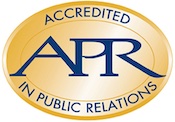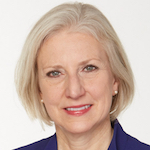Opposition by PRSA members stopped bylaw proposals that would have increased board power to amend bylaws and which would have eliminated district representation on the board.
Pulled just before the Assembly Oct.7 in Boston was a bylaw requiring a two-thirds majority vote of the Assembly to overturn a board proposal as opposed to the current two-thirds vote of the Assembly needed to adopt a board recommended bylaw.
Three of the board’s seven proposals to the Assembly were withdrawn because of member opposition.
The board sank to a new low in blocking information available to members and the press. No reports at all of what went on in the Assembly were posted in either the member area or non-member area of the Society’s website. The only items in the "newsroom" are awards to four members.
Registration for the conference totaled about 1,200 which included more than 20 PRSA staffers and exhibitors.
Jack O'Dwyer "Engagement" Discussed
Minutes for the April 21-22 board meeting at the JW Marriott hotel in Austin, which had been withheld from the members until recently, had this sentence: "The chair (Jane Dvorak) gave an update and the board discussed the status of engagement with Jack O'Dwyer." No further details were given.
Up until 2006, audio recordings and transcripts of the entire Assembly were placed in the public area of the Society’s website. The Canadian PR Society webcasts its annual meeting live.
For the first time in Society history, there was no “press or media room” at the conference. Society policies and practices are a discredit and embarrassment to the industry and the reason it has not grown since 2000 and the reason its revenues are below what they were ten years ago. Renaming "PR" as "communications" will not help it.
New Website Rapped; Membership Dips
The re-engineered PRSA website was criticized by West who said, “I have yet to speak to a PRSA colleague who has had any form of positive user experience” with it.
She noted that membership had dropped to 21,201 as of March 31 vs. 21,905 at the end of 2015. That’s a loss of about $179K in revenues, she noted.
The most controversial board proposal was a bid to replace “PR” with “communications” throughout the bylaws. What happened to that proposal has yet to be revealed.
Judgment of Leaders Questioned
West wrote on her website Aug. 18 that members should “question seriously the intent and judgment of any PRSA national leadership body that would engage in a manner of behavior to expand and leverage its own power at the expense of not only democracy within the Society’s governance structure but also our organizational transparency, credibility and brand reputation, both internally and externally.”
PRSA’s ideal for ethics and professional excellence “drives the core of why people choose membership affiliation — and that ideal is far larger and further rooted than the presence of any specific leader or group of leaders,” she said.
“However, when the stewardship of PRSA’s brand identity/ideal falls into poor leadership decision-making, the impact is felt by all and poses danger to the foundation of the Society — particularly if left unchecked,” she added.
Said West: “The board is appearing to seek . . . quite unabashedly . . . a new role as the near-alpha and omega of Society bylaw creation, interpretation and enforcement, while the PRSA Assembly delegation and members at-large are left completely in the dark as to board goings-on, hidden from prying eyes that would otherwise stand equipped to demand accountability.”
Board proposals “fly in the face of multiple Code provisions” that “protect and advance the free flow of accurate and truthful information,” she said. West called the governance proposals “more than a bit alarming.”
PRSA/NY Joins National in Info Blackout
Since PRSA national barred O’Dwyer reporters from the Assembly, we asked New York chapter leaders if any of the six delegates would cover for us.
Chapter president Olga Gonzales not only refused to allow this, but refused to identify the six delegates even though the chapter website promises their names.
The bylaw proposal to change “PR” to “communications” in “most locations,” touched off a furious debate on the Society’s website.
“PRSA should be advocating on behalf of public relations,” wrote Kay Barkin, MHMR, Fort Worth.
PRSA CCO Laura Kane, answering the critics, said only 13% of members have “PR” in their titles. “We selected the term communications because it is more encompassing than PR.”
“The intention of the bylaw,” she said, “was to address the importance of digital and social on the profession as it continues to evolve. What has traditionally been defined as PR is now being described as social media, digital communications, content management and influencer marketing among others.”
PRSA Should Promote “PR,” Says Member
“Wouldn’t it be the role of PRSA to help individuals with all these different titles to understand they are part of PR, instead of simply making PR part of communications?” Barkin asks.
Titles that Kane had mentioned in a response to her “would fit neatly under PR in the profession’s truest sense as strategies or tactics, and it seems to me PRSA should be advocating on behalf of PR,” she added.
Anthony Hicks of SRVS, Memphis, said “Completely eliminating the words PR from the bylaws of a professional assn. with PR in its official name, that is founded and grounded in PR, is a pretty significant move that seems to warrant a compromise.”
The reason for the change, wrote Kane, was “to take a forward look at where titles associated with our profession are headed.”


 PRSA-NY today announced its five honorary co-chairs for its Big Apple Awards ceremony gala slated for TAO Downtown on Nov. 15.
PRSA-NY today announced its five honorary co-chairs for its Big Apple Awards ceremony gala slated for TAO Downtown on Nov. 15. PRSA-NY president Carmella Glover today issued a "heartfelt apology" on behalf of the chapter for her Oct. 14 message that "caused disappointment and hurt to some of our valued members."
PRSA-NY president Carmella Glover today issued a "heartfelt apology" on behalf of the chapter for her Oct. 14 message that "caused disappointment and hurt to some of our valued members." The leadership of Public Relations Society of America is backing a move to change the current “must-have” APR accreditation to “strongly preferred” as a requirement for a seat on its board of directors.
The leadership of Public Relations Society of America is backing a move to change the current “must-have” APR accreditation to “strongly preferred” as a requirement for a seat on its board of directors. Public Relations Society of American today named Linda Thomas Brooks CEO, succeeding CFO Phil Bonaventura, interim chief since July 2019.
Public Relations Society of American today named Linda Thomas Brooks CEO, succeeding CFO Phil Bonaventura, interim chief since July 2019.


 Have a comment? Send it to
Have a comment? Send it to 
No comments have been submitted for this story yet.